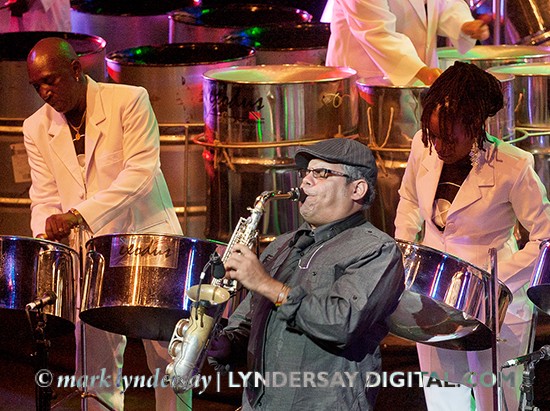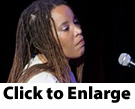Trinidad and Tobago Steelpan and Jazz Festival, 2010
08/11/10 19:47 Filed in: Reviews
Pan in a kinda rage
Photos and text by Mark Lyndersay
Originally published in the Trinidad Guardian on November 04, 2010.

Cuban saxophonist César Lopez performs with Exodus Steel Orchestra at the 2010 Steelpan and Jazz Festival on Saturday night at Queen's Hall. Photography by Mark Lyndersay.
The Steelpan and Jazz Festival began at an even, mellow pace with Chantal Esdelle’s Final Farewell, establishing her band Moyenne as a balanced, capable quartet before they expanded to a quintet with the addition of a percussionist.
Their work was delicate and smooth, with Esdelle’s mellow scat on Changes, the band’s third number, adding a pleasant edge to the number that drew an appreciative “yeah” from the audience.
 Their short set was tight and clean and even, it might be said, a bit restrained, with the standout performance for the evening coming from bassist Douglas Redon, who spanked, throttled and boomed his way through lively outings that were less solos than exhilarating expansions on the melody.
Their short set was tight and clean and even, it might be said, a bit restrained, with the standout performance for the evening coming from bassist Douglas Redon, who spanked, throttled and boomed his way through lively outings that were less solos than exhilarating expansions on the melody.
I listened keenly to hear if Esdelle would take advantage of the throaty timbre of the Queen’s Hall grand piano, a subtly richer instrument than her usual electric keyboard, but she remained very much the bandleader, keeping her band on point for an exemplary and well-appreciated performance of original works.
 César Lopez and the Habana Ensemble were on next and set a stunning standard for the evening’s proceedings. None of the numbers were announced, but the pattern of their playing quickly became clear.
César Lopez and the Habana Ensemble were on next and set a stunning standard for the evening’s proceedings. None of the numbers were announced, but the pattern of their playing quickly became clear.
Lopez establishes the line and melody of the song before handing it off to his guitarist, Emilio Martini, a refreshingly original player who eschews the kind of lead playing that’s expected of jazz guitarists in favour of discordant runs that often head off in wildly divergent directions from the melody.
The electric guitar as an instrument rarely plays this kind of central role in regional jazz and when it does, it tends to follow fairly well-established patterns.
Martini offered no pretence with his instrument, stepping quickly on his effects pedals during his extended runs, shaping his dissonant sound in ways that often called the whole direction of the song in to question.
He played like a man rethinking Ornette Coleman for the fretboard, and the results were often as infuriating as they were exciting.
Martini’s playing would provide considerable inspiration for the band’s drummer, an enthusiastic player who would, on several occasions, engage in sharp interludes of call and response with Martini’s curious chords.
In one generous moment in during the band’s performance, Lopez invited pannist Keisha Codrington to play on Sunny, but while her playing was quick and precise, it was clear that she was only a guest on the stage with a band this tightly integrated. It was hard to resist leaning forward and urging her to play more into the melody instead of waiting for the band to leave her an opening for a break.
 And so we come to the pan, half the point of the show.
And so we come to the pan, half the point of the show.
There have been several editions of this celebration of the steelpan as an instrument in jazz, so it’s likely that my concerns about the way the instrument was used in Saturday’s event are likely to have either been voiced before or will stir reflexive disagreement.
Exodus, following César Lopez, had its work cut out for it and the challenge would be amplified by the band’s decision to field a large orchestra.
Here’s the thing, the challenge of even a craftily skilful band like Exodus playing jazz is that it butts up against the same issues that a choir would have trying to do the same thing.
There’s a good reason, I think, why so many songs written for the pan sound so thin when played on traditional instruments.
The group harmonics that drive the best examples found in both groupings run counter to the kind of nimble experimentation that is at the heart of the best of jazz.
Adding brass for a pleasant enough reading of Earth, Wind and Fire’s Reasons didn’t move things any closer to something that could be described as jazz either.
Indeed, for most of the evening, Exodus was a backing band and while it was one supplemented by the playing of arranger Pelham Goddard (keyboards) and pannist Earl Brooks, their contributions were, by and large, buried in the mix.
 The playing was capable in support of vocalists KV Charles, Natalie Yorke and a return performance by César Lopez who led the band through a surprisingly turgid reading of Just the way you are.
The playing was capable in support of vocalists KV Charles, Natalie Yorke and a return performance by César Lopez who led the band through a surprisingly turgid reading of Just the way you are.
Things would drift even further downhill with an unfortunate attempt to replicate the clean electronic wobble of Herbie Hancock’s Odyssey synthesiser on the seminal jazz funk piece Chameleon using around 40 pannists.
It was an experiment itching to go awry with too many instruments pursuing a fusion number originally played by five musicians.
Exodus would bookend their performances with two numbers that played to their strengths, Steelband Times and Bazodee, a composition by the evening’s honoree, Ray Holman.
Except for those songs, composed and arranged for the large steelband, Exodus might have brought more to its performance with fewer instruments and more musicianship.
Photos and text by Mark Lyndersay
Originally published in the Trinidad Guardian on November 04, 2010.

Cuban saxophonist César Lopez performs with Exodus Steel Orchestra at the 2010 Steelpan and Jazz Festival on Saturday night at Queen's Hall. Photography by Mark Lyndersay.
The Steelpan and Jazz Festival began at an even, mellow pace with Chantal Esdelle’s Final Farewell, establishing her band Moyenne as a balanced, capable quartet before they expanded to a quintet with the addition of a percussionist.
Their work was delicate and smooth, with Esdelle’s mellow scat on Changes, the band’s third number, adding a pleasant edge to the number that drew an appreciative “yeah” from the audience.

I listened keenly to hear if Esdelle would take advantage of the throaty timbre of the Queen’s Hall grand piano, a subtly richer instrument than her usual electric keyboard, but she remained very much the bandleader, keeping her band on point for an exemplary and well-appreciated performance of original works.

Lopez establishes the line and melody of the song before handing it off to his guitarist, Emilio Martini, a refreshingly original player who eschews the kind of lead playing that’s expected of jazz guitarists in favour of discordant runs that often head off in wildly divergent directions from the melody.
The electric guitar as an instrument rarely plays this kind of central role in regional jazz and when it does, it tends to follow fairly well-established patterns.
Martini offered no pretence with his instrument, stepping quickly on his effects pedals during his extended runs, shaping his dissonant sound in ways that often called the whole direction of the song in to question.
He played like a man rethinking Ornette Coleman for the fretboard, and the results were often as infuriating as they were exciting.
Martini’s playing would provide considerable inspiration for the band’s drummer, an enthusiastic player who would, on several occasions, engage in sharp interludes of call and response with Martini’s curious chords.
In one generous moment in during the band’s performance, Lopez invited pannist Keisha Codrington to play on Sunny, but while her playing was quick and precise, it was clear that she was only a guest on the stage with a band this tightly integrated. It was hard to resist leaning forward and urging her to play more into the melody instead of waiting for the band to leave her an opening for a break.

There have been several editions of this celebration of the steelpan as an instrument in jazz, so it’s likely that my concerns about the way the instrument was used in Saturday’s event are likely to have either been voiced before or will stir reflexive disagreement.
Exodus, following César Lopez, had its work cut out for it and the challenge would be amplified by the band’s decision to field a large orchestra.
Here’s the thing, the challenge of even a craftily skilful band like Exodus playing jazz is that it butts up against the same issues that a choir would have trying to do the same thing.
There’s a good reason, I think, why so many songs written for the pan sound so thin when played on traditional instruments.
The group harmonics that drive the best examples found in both groupings run counter to the kind of nimble experimentation that is at the heart of the best of jazz.
Adding brass for a pleasant enough reading of Earth, Wind and Fire’s Reasons didn’t move things any closer to something that could be described as jazz either.
Indeed, for most of the evening, Exodus was a backing band and while it was one supplemented by the playing of arranger Pelham Goddard (keyboards) and pannist Earl Brooks, their contributions were, by and large, buried in the mix.

Things would drift even further downhill with an unfortunate attempt to replicate the clean electronic wobble of Herbie Hancock’s Odyssey synthesiser on the seminal jazz funk piece Chameleon using around 40 pannists.
It was an experiment itching to go awry with too many instruments pursuing a fusion number originally played by five musicians.
Exodus would bookend their performances with two numbers that played to their strengths, Steelband Times and Bazodee, a composition by the evening’s honoree, Ray Holman.
Except for those songs, composed and arranged for the large steelband, Exodus might have brought more to its performance with fewer instruments and more musicianship.
blog comments powered by Disqus